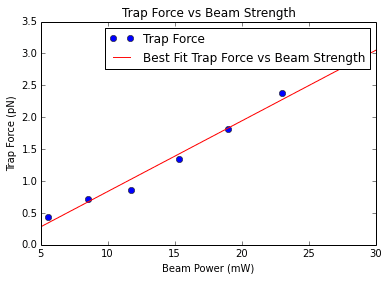Optical Tweezers: Difference between revisions
Jump to navigation
Jump to search
No edit summary |
|||
| Line 52: | Line 52: | ||
</li> | </li> | ||
<li> | <li> | ||
<table> | <table border='1' border-collapse='collapse'> | ||
<th>Beam Power (mW)</th> | <th>Beam Power (mW)</th> | ||
<th>Escape Velocity (microns/second)</th> | <th>Escape Velocity (microns/second)</th> | ||
Revision as of 03:23, 29 May 2014
Optical Tweezers
Resources
- [1] Directions on how to use a QPD in an optical tweezer setup.
- [2] Here are some slide prepping instructions from Berkeley.
Our own setup
- Here's how we did our Slide Set-Up.
Using NI Vision Assistant
- [3] Image Acquisition/Saving Images
-
[4] How to track the microspheres in NI Vision Assistant using pattern matching.
- We recommend not doing it using pattern matching and either brute force point and click track the spheres, or use the QPD to record position. The pattern matching gave variable results.
Our calculations using Brownian Motion
-
2.56 micrometer spheres
- 4.6 mW Beam [5]
Calculating Trap Forces Using Stokes' Drag Force
- [6] iPython Calculations
-
Beam Power (mW) Escape Velocity (microns/second) Trap Force (pN) 5.5 20.57 0.44 8.5 33.49 0.72 11.7 40.00 0.86 15.3 62.60 1.34 19.0 84.71 1.82 23.0 110.77 2.38 -

- A simple calculation would say that I need a 10 billion watt laser to achieve a 1 Newton trapping force.